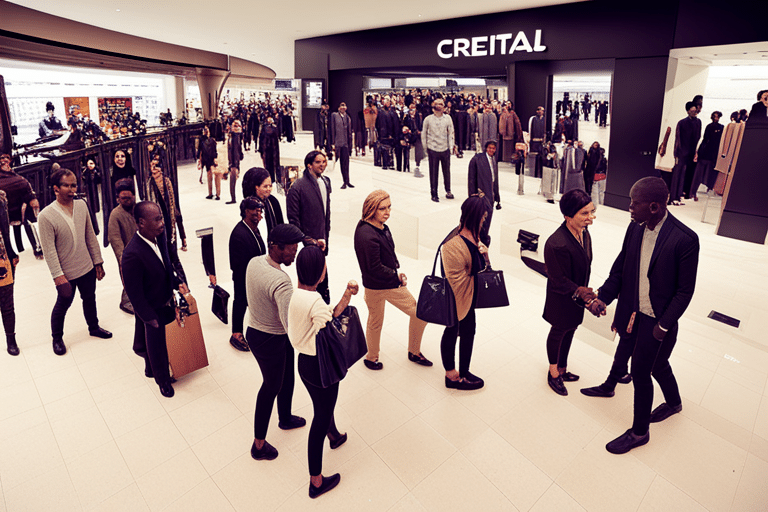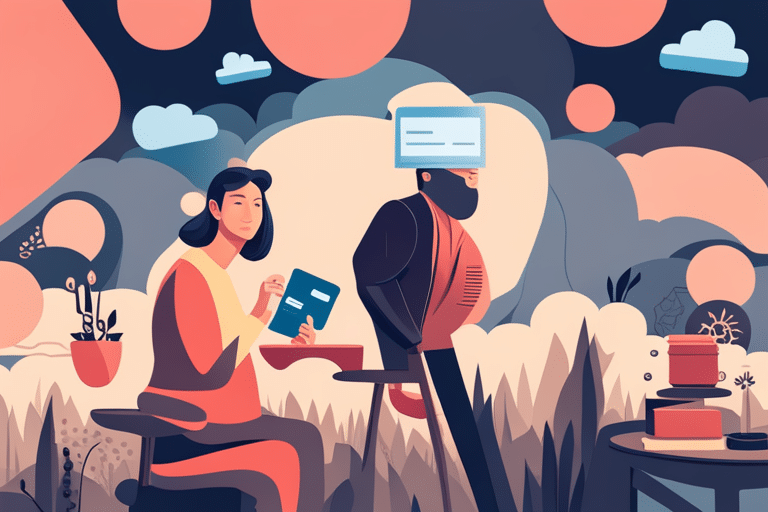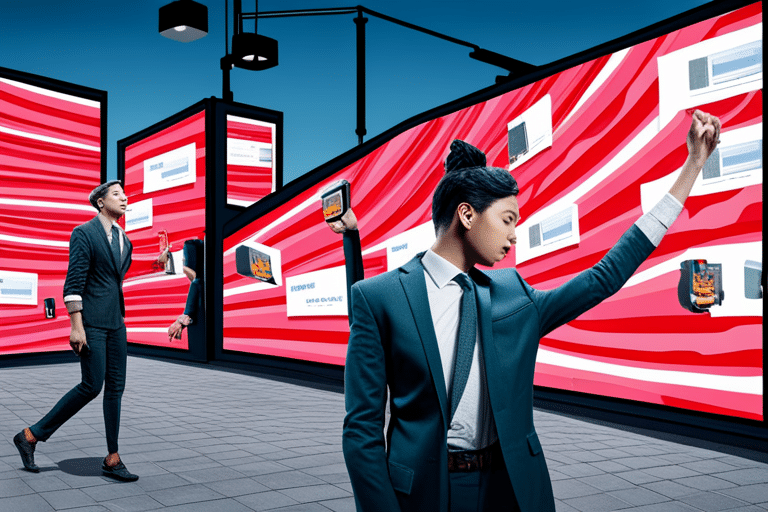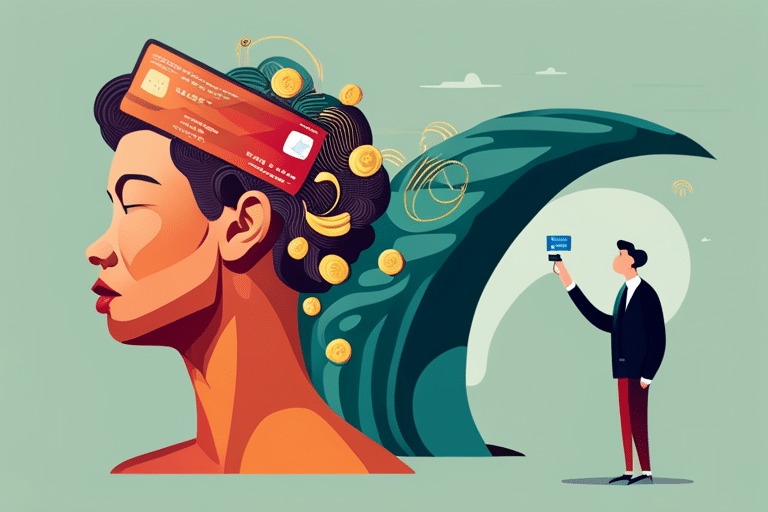Hey there! Ever wonder why you can’t resist whipping out that credit card for yet another impulse buy? Well, buckle up because we’re about to dive deep into the fascinating world of credit card spending psychology.
In this article, we’ll unravel the power of those impulsive purchases, explore how social influence plays a role in our spending habits, and even uncover the emotional triggers that make us swipe away.
Get ready to master your understanding of how your mind and those sneaky cognitive biases can impact your credit card decisions!
Key Takeaways
- Impulse purchases significantly impact credit card spending habits.
- The psychology of temptation plays a clever game on the mind.
- Emotional triggers influence credit card spending habits.
- Understanding the connection between self-worth and credit card spending can help make conscious choices aligned with long-term goals and fulfillment.
The Power of Impulse Purchases

Impulse purchases can have a significant impact on your credit card spending habits. It’s like being under the spell of a mischievous magician, luring you with their tricks and illusions. The psychology of temptation plays a clever game on your mind, making you believe that you absolutely need that shiny new gadget or that trendy outfit.
But beware! Hidden costs lie beneath the surface of these impulsive buying decisions.
In the heat of the moment, it’s easy to forget about the consequences. That rush of excitement when swiping your card may feel invigorating, but it comes at a price – literally. Those small impulse buys quickly add up, turning into hefty credit card bills that sneakily accumulate interest over time.
The Role of Social Influence in Credit Card Spending

You can’t underestimate the impact that social influence has on your credit card spending habits. It’s easy to think that you make all your financial decisions independently, but in reality, social pressure and peer influence play a significant role in shaping your spending behaviors.
Here are a few ways in which this happens:
-
Keeping up with the Joneses: You feel compelled to match the spending habits of those around you, even if it means going beyond your means.
-
Fear of Missing Out (FOMO): Seeing friends or colleagues flaunting their latest purchases can create a fear of missing out, causing you to make impulsive buying decisions.
-
Group mentality: When everyone around you is making extravagant purchases, it becomes normalized and makes it harder for you to resist the temptation.
-
Unconscious mimicry: Without realizing it, you may mimic the spending patterns of those close to you simply because they are doing it.
Understanding how social influence affects your credit card spending habits allows you to be more aware and mindful of these influences. So next time, before swiping that card, take a moment to consider whether it’s truly what you want or if external pressures are guiding your decision.
The Impact of Emotional Triggers on Credit Card Use

Hey, you! Ready for a wild ride into the world of credit card spending? Buckle up because we’re about to dive deep into the emotional rollercoaster that triggers your spending habits.
From that irresistible splurge after a tough day at work to the psychological tricks that make you reach for your wallet, this discussion will unravel it all.
But fear not, my friend, because we’ll also explore how to regain control over those impulsive credit card urges.
Emotional Spending Triggers
When it comes to emotional spending triggers, it’s important to be aware of the feelings that may lead you to make impulsive credit card purchases. Your emotions can easily influence your buying decisions, especially when you’re bombarded with enticing advertisements on social media.
Here are some common emotional triggers that may lure you into swiping your credit card without thinking twice:
-
Fear of missing out (FOMO): Seeing others posting about their latest purchases can create a sense of urgency and make you feel like you need to keep up.
-
Instant gratification: The desire for immediate pleasure and satisfaction can lead to impulsive buying.
-
Stress relief: Retail therapy is a real thing! When you’re feeling stressed or down, shopping can temporarily boost your mood.
-
Social validation: The need for approval from others can drive you to purchase things that align with societal expectations.
Psychological Influence on Spending
The psychological factors that influence our spending habits can be quite powerful. It’s like there’s a little imp inside your brain, constantly whispering to you, ‘Buy it! You need it! Treat yourself!’ And let’s face it, sometimes that imp wins.
But fear not, my friend, for there are ways to tame the impulse control beast and regain control over your spending. One technique is to simply take a deep breath before making any purchase. This gives you a moment to pause and reflect on whether you really need or want the item in question.
Another technique is to create a budget and stick to it religiously. By setting limits for yourself, you can avoid falling into the trap of mindless spending.
Controlling Credit Card Impulses
One way to curb those impulsive credit card purchases is by setting clear spending limits for yourself. It may not sound like the most exciting thing in the world, but trust me, it can make a huge difference! Here are some self-control techniques that can help you keep your credit card impulses in check:
-
Create a budget and stick to it like glue. This will give you a clear picture of how much you can afford to spend each month.
-
Leave your credit cards at home when you go out. If they’re not easily accessible, you’ll be less likely to whip them out on a whim.
-
Practice delayed gratification. Instead of buying something right away, give yourself time to think about whether or not you really need it.
-
Find healthy alternatives for dealing with stress or boredom that don’t involve swiping your credit card.
By implementing these strategies, you’ll have better control over your impulses and be able to make more conscious decisions about your credit card spending habits.
Understanding the Connection Between Self-Worth and Credit Card Spending

If you’re struggling with your self-worth, you might find yourself using credit cards as a way to temporarily boost your confidence. It’s easy to get caught up in the cycle of buying things to feel better about yourself, but this can have serious consequences for your financial well-being. Your self-esteem and spending habits are closely connected, and it’s important to understand how your self-perception influences your financial decisions.
Consider the following table:
| Self-Perception | Financial Decisions |
|---|---|
| Feeling unworthy or inadequate | Impulsive spending, seeking validation through material possessions |
| Having a positive self-image | Making thoughtful purchases based on personal values and priorities |
When you view yourself in a negative light, you may use shopping as a coping mechanism. However, this temporary high can quickly turn into regret when the bills start piling up. Building genuine self-esteem means finding value within yourself rather than relying on external factors like possessions. By understanding the connection between self-worth and credit card spending, you can make more conscious choices that align with your long-term goals and true sense of fulfillment.
How Cognitive Biases Affect Credit Card Purchase Decisions

When it comes to making credit card purchases, you may not realize how cognitive biases can influence your decisions. These subconscious mental shortcuts can lead you astray and cause you to make impulsive or irrational choices.
So, before swiping that shiny plastic, take a moment to consider the ways in which cognitive biases might be affecting your decision-making process:
-
Anchoring bias: Your mind tends to rely heavily on the first piece of information it receives. Be aware of this when deciding on a budget or determining a purchase’s value.
-
Confirmation bias: You seek out information that confirms your existing beliefs while ignoring anything that contradicts them. Stay open-minded and consider all perspectives.
-
Availability heuristic: You base judgments on readily available examples rather than analyzing the full range of possibilities. Don’t let recent experiences cloud your judgment.
-
Loss aversion: The fear of losing something often leads to overly cautious decision-making. Remember, sometimes taking risks can lead to great rewards!
The Influence of Marketing Strategies on Credit Card Spending Patterns

Hey there!
So, you’ve probably noticed all those catchy credit card ads that make it seem like swiping that plastic is the key to happiness.
Well, in this discussion, we’re going to dive into how marketing tactics and spending patterns go hand in hand when it comes to your credit card habits.
From clever strategies to flashy promotions, we’ll explore how these techniques can impact your decision-making process and ultimately affect your overall financial well-being.
Marketing Tactics and Spending
Marketing tactics can influence your spending behavior when it comes to using credit cards. The clever strategies employed by marketers tap into your cognitive biases, making you more likely to whip out that plastic and spend away.
Here are a few ways marketing tactics sway your credit card usage:
-
Scarcity: Limited time offers or exclusive deals create a sense of urgency, pushing you to make impulsive purchases.
-
Social proof: Seeing others enjoy the benefits of a particular card or offer convinces you that you should do the same.
-
Rewards programs: Promising cash back, airline miles, or other perks entice you to use your credit card for everyday expenses.
-
Emotional appeals: Advertisements often play on your desires and fears, triggering emotional responses that lead to impulse buys.
Impacts of Advertising
If you’re not careful, advertising can subtly influence your purchasing decisions and lead to impulsive buying. It’s like having a mischievous little voice in your head that whispers, ‘Buy it, buy it now!’
You may not even realize it, but advertising has a way of sneaking into your subconscious mind and persuading you to make purchases you didn’t necessarily plan on. Those catchy jingles, captivating visuals, and persuasive slogans all work together to create an irresistible urge to buy.
Before you know it, you’ve clicked that ‘Add to Cart’ button or swiped your credit card without a second thought. But fear not! By understanding the power of advertising’s influence and being aware of its subconscious persuasion tactics, you can regain control over your spending habits and make more mindful purchasing decisions.
Frequently Asked Questions
How Can I Resist the Temptation of Impulse Purchases and Better Manage My Credit Card Spending?
You can resist impulse purchases and manage credit card spending by creating a budget, setting financial goals, and using cash or debit cards instead of credit. Stay strong and stay in control!
What Are Some Effective Strategies to Reduce the Influence of Social Pressure on My Credit Card Spending Habits?
To reduce social pressure’s influence on your credit card spending, try these strategies: set a budget, prioritize needs over wants, avoid comparison with others, and surround yourself with supportive friends who understand your financial goals.
How Can I Identify and Avoid Emotional Triggers That Lead to Unnecessary Credit Card Use?
To avoid unnecessary credit card spending, identify emotional triggers like stress or boredom. Treat them as sirens blaring for caution. Find healthier alternatives, like exercise or hobbies, that can satisfy your needs without breaking the bank.
Is There a Correlation Between a Person’s Self-Worth and Their Tendency to Engage in Excessive Credit Card Spending?
Your self-worth and emotional spending may be linked. When feeling low, you might splurge on credit card purchases to boost your confidence. Be mindful of this correlation and find healthier ways to boost your self-esteem.
What Are Some Common Cognitive Biases That Affect Credit Card Purchase Decisions and How Can I Overcome Them?
When it comes to credit card spending, cognitive biases can really mess with your decision-making. But fear not! By understanding these biases and employing savvy strategies, you’ll conquer them like a boss.
Conclusion
So there you have it, my dear friend! Credit card spending is not just about numbers and transactions; it’s a fascinating insight into the human mind.
From the power of impulse purchases to the influence of social pressure, our psychology plays a significant role in how we use our credit cards. Emotional triggers and cognitive biases further shape our spending decisions, while marketing strategies cleverly nudge us towards certain patterns.
It’s like a dance between our desires and the tricks of the trade. So next time you swipe that card, remember: you’re not just buying stuff, you’re navigating a complex web of emotions and influences.

